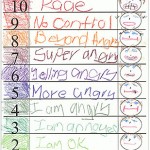Angry Children

Anger has been one of the most common reasons why children come to see me. Often children are experiencing other emotions behind their anger. Other emotions may be fear, anxiety, sadness even pain. Anger can be a common 'go-to' emotion. Anger can protect, anger can keep people away, and anger can also help children hide what they are really feeling underneath.
Children often start at a happy level and may follow a basic progression until they are yelling and kicking or throwing their toys. Other kids may seem fine and then, all of a sudden, they could be angry then quickly out of control. Each child is different and experiences anger (as well as other emotions) in very different ways. Children often have “triggers” for their emotions. Certain things will set them off and make them more upset. Maybe there are certain phrases, consequences for actions, or even remembering something can make a child angrier. Other common events that make children angry include: death, divorice, loss of a pet, moving either them or another family member, or other transitions (new school ect.).
Evaluating Anger in Children
I like to use a basic scale to help children understand their anger. What colors remind them of each emotional phase, what faces do they make and even what things make them angry.
The first step is to help the child identify and work through their anger. While it is possible to just be angry (keeping in mind every child is different) there is also potential for the anger to be hiding something else.
The second step is to watch for clues and triggers. Have they moved, experienced loss or some other major life event? Is there any reason for them to feel hurt, anxious or afraid? Any of those factors can be contributing or causing anger.
The third step is to keep calm and communicate healthy self-expression and give different options for the child to choose from when redirecting their anger. Don't get angry back or raise your voice because that adds tension and gives them more of a reason to be angry themselves.
If their anger is taking up too much of your emotional time or energy or if you have tried everything else and 'nothing works' you may want to considering seeking the help of a child counselor.